The Journals of Ayn Rand Read online
Page 38
If men’s desperate rebellion against the objective world, reason, and justice is, at [root], a rebellion against the shortcomings of their own natural endowments, if men scream so much against the “injustice” of being born without some special great talent or desirable faculty—why don’t they exercise such faculties as they have, instead? Most of their unhappiness in this line (with the possible exception of physical beauty) comes from second-handedness. They don’t want to write—they want the fame, money, and prestige of a writer. If they had an actual, personal desire to write, i.e., if they had something to say—without any second-handedness involved, no desire to impress, nor any desire to re-hash some plagiarized ideas—they would have the talent. Men usually have the talent for that which they want to do—if they really want to do it, i.e., if their primary motive is personal, not second-hand.
The pattern of spiritual human relationship under my code of ethics has the form of a sale—value for value received; the pattern under the code of altruism is that of graft—of a bribe.
July 21, 1945
Advice to people on what to do under my ethics: name your action by its actual name, i.e., be conscious at any moment of what it is you’re doing. Above all, be conscious of what you’re doing in the long run, of your overall meaning and goal. People think from moment to moment—they don’t connect—they have not acquired the idea of a whole life. That is why they whine in middle age: “What was it all about?” (They exist in the manner of consciousness of an animal.)
Make a note of the way in which people actually lose all capacity to think when they appoint themselves as thinkers for others, as molders or expressers of “public opinion.” They do make sense in their specific, individual and selfish job. But there is a peculiar, special kind of rottenness that [takes hold] in them the moment they begin to think in or for “the public.”
This applies both to such cases as a reader who has good independent judgment until he becomes an editor—and to such cases as when a man has to defend his views in public. This last may be due either to the innocent fact of being unprepared and not connecting new ideas fast enough—or to the much more vicious fact that a man feels no necessity to have any “wider” convictions (philosophical, social, or political), but feels he must have them as window-dressing, so whatever nonsense he spouts, he spouts only to make a “cultured” impression on the listener. He doesn’t want to believe, he only wants to convince you he believes something. Now this is real second-handedness in operation; abstract convictions, ethics, ideals, philosophies are [regarded as] only a social convention, only a means to an end. That is the real absence of an ego.
How do those people exist? Not too well. Obviously they’re not happy and they’re running from themselves. But can anything be taught to them? Can they be shown their own emptiness? This is hard to answer. I suppose, not until they want to see it. Not until some form of suffering makes them question themselves. The thing that puzzles me is only: how do those people exist at all, without realizing that central emptiness? Isn’t it something they should discover for themselves and at once? The truth is probably that they have some most peculiar, logically twisted substitute or excuse or justification. The thing that bothers me here is: how can people live in inconsistency? The immediate answer would be: because it’s so difficult to be consistent and rational (and besides they have been trained not to be). Therefore, they take inconsistency as a law of existence, they’re bewildered, they can’t untangle things—but they have to go on living, so they let it go at that.
The main difference between me and them is that I try to keep my thinking straight and give my complete, honest, interested attention to any intellectual argument. They either don’t want to try, or are indifferent, or actually resent it when brought face to face with the necessity to think and connect. I try to live consciously, from the basic principle on up to every detail. They live, essentially, by chance. The most important questions are the ones they won’t or can’t face.
July 22, 1945
Knowledge grows from basic premises like a plant from a seed. The seed is like a basic premise in which all the details and consequences of the future plant are contained—and only a certain plant can grow from a certain seed. Once you have accepted a basic premise, you will have to follow and accept all the consequences, because they are in the seed. You have no power to change the nature of the universe, the nature of matter or its laws; and you have no power to change the nature of a logical sequence. But where is your freedom and the field of your free will? In exercising [your reason] to understand [nature] and use it as material to fulfill your purpose. You set the goal and the meaning; the field of choice and possibilities is immense; the only necessity involved is that you use the material as it is and your tool (reason) as it is—that you understand them for what they are before you choose or achieve a purpose.
Do not call it a “limit.” The basic fact of reality is a “limit”—the fact of existence, which presupposes an entity, which means a thing differentiated by certain intrinsic, essential attributes from that which it is not. “To be” implies a “limit”—a distinction from that which is not. If you demanded “freedom” from the natural world—you would demand, in effect, an undifferentiated chaos, the non-existence of entities, actually more than death—the annihilation of the conception of the possibility of living.
We apply reason to the material world, but not to the spiritual, not to ourselves. The material world gives us an objective standard, a starting point, a solid fact, the something from which we have to proceed—since we cannot create something out of nothing, or base something on nothing. There is no such standard in the spiritual world. Yet the rational faculty should be that starting point. And a moral code should be that standard.
In dealing with physical nature each man is an independent judge: he will consider a car good if the car runs—and he will make sure that he sees the car running. But in the spiritual world men are second-handers: they place the quality of judgment within the consciousness of others, being lost and unsure within their own. So we have the paradox that in physical matters the actual value and performance of the product is the standard (people will buy a car if it is a good car), but in spiritual matters (precisely in the realm of greatest, absolute individualism) the collective counting of noses is the standard (a book is good if people buy it). Physical values are thus ethical (based on value-judgments) and personal—but spiritual values are non-moral and “commercial” in the most vulgar sense of the word. Physical values become an end in themselves, moral values a means to an end. (There is here a strange circle. Our rational faculty is the means of obtaining satisfaction from the physical world. But the satisfaction is spiritual, since the physical is only a means to the satisfaction of our desires—and of more than our physical desires.)
The essence of morality is to desire that which is good. But we must define what is good—and that is the purpose of a code of ethics.
This point must cover and account for the fact that some people admit virtue without desiring it—such as Mallory’s “the genius recognized too well—the people who see it and don’t want it”; or “He’s a saint—I don’t like saints.”
Is the cause here the fact that people think of morality as an arbitrarily prescribed code of ethics, the Christian code, and rebel against it? Isn’t the greatest error of all morality the fact that the moral systems prescribed concrete rules, arbitrarily, instead of general principles that would allow men precisely the essence of morality—a free choice between good and evil? Think this over. The key here is the relation of the abstract to the concrete, of the general to the particular—and the need is that of a clear statement of the line dividing the two and of the relationship between the two.
What actually happens when men get lost in abstractions? What is the nature and cause of a “floating abstraction”?
Think over the relation of “survival” to happiness, the exact point in the process of man choosing a goal. And the relation of the material to the spiritual.
Humanitarians claim to hate suffering, and therefore to make it their goal to eliminate it. They take for granted that happiness is automatic, but suffering is not and therefore we must direct our actions at eliminating suffering. But it is precisely happiness (or good or virtue) that is not automatic and must be achieved by effort and purposeful action. Suffering comes automatically from the absence of action. (To be exact, the absence of the right action; if you do nothing at all, or if you make a mistake and do nothing to correct it, that’s when suffering will come automatically as your proper, natural punishment. Everything good—desirable—has to be achieved.)
But you want to act to relieve the suffering of others? Can you? To what extent? And why should you? And at what price? And is that the chief goal of life? Is your goal to run around correcting errors—or to act straight?
Here there enters the question of what it is you love when you love “Man.” Again, a reversal of the abstract and the concrete that destroys the concrete. By loving “Man” as an abstraction in the sense of loving any and all men, you end up by loving the worst of men. By loving “Man” as an ideal, you love actual men and the best among them. What is the difference between “abstract” and “general”? Between “archetype” or “ideal” and “average”? There might be an important key here.
July 23, 1945
The person who believes in determinism (personal or historical) merely confesses the truth about himself: he is not a prime-mover, he does not know what makes him act or how or why—therefore he assumes that others are equally “determined,” floating non-entities pushed around by chance. Having no prime-moving ego within himself, such a person assumes one of two things: either that others are equally uncertain—therefore “so
mething” outside moves us all; or that others know and decide, while he can‘t—so he accepts them as the mover and the standard. Usually it’s both, since the essence of a second-hander’s thinking is that he does not think, therefore none of his premises are too clear and all of them are contradictory. If this were not so, if he were completely consistent with anything, he wouldn’t be a second-hander.
Can purpose determine entity? Purpose presupposes the one (a consciousness) who sets the purpose. And man is that one—the standard, the point of beginning. Think this over. (Plato said function determines virtue. I mean something much more than that.)
July 27, 1945
An animal can have self-respect automatically—“I am good such as I am,” because the capacity of self-destruction is not within him. A man’s self-respect (and instinct of self-preservation) must be conscious (based on a standard of values) because he can be his own destroyer. That is his great innate fear—and one of the causes of his rebellion against reason, against the terrible responsibility which the rational faculty involves.
The tendency of all civilization has been toward division of labor—not collectivization. Toward splitting jobs into separate activities—not toward doing things more and more “together.” All economic progress has come from that. But, it may be said, since each man does only a part of the whole—shouldn’t there be a collective direction and shouldn’t the whole direct the parts? The whole does direct the parts—by the mechanism of supply and demand, which is actually the verdict of the majority upon what kind of work it wishes done. But it is the whole as a number of individual units acting independently, each exercising his judgment for his own good. It is not the artificial arrangement of a “whole” out of units that cannot be added together, a whole that involves the sacrifice of some parts to others and is not, therefore, a whole. Each man should have a say about economic production and consumption? He does. By producing and by buying. In this way, each man decides for himself, and the “whole” is the sum of such decisions. In the collectivist way, each would have to decide for all—which is impossible in practice and vicious in concept, since it is the diametric opposite of human nature.
July 28, 1945
The mental and moral corruption of so-called intellectuals is due to the fact that they are the real class of “exploiters.” Men cannot be enslaved by sheer force alone—it would take too many people, so no parasitical minority could enslave the productive majority. The enslavement has to be done by spiritual means, by making men feel that their slavery is “right.” (This was done by every tyrant in history and by modem dictators.) Therefore it’s the “intellectuals” who become the spearhead, the professional tools and source of any human enslavement. They’re second-handers, collectivists, altruists—and getting paid for nothing. They believe that one can build that mode of living into a system.
Defeat collectivists and altruists by the single method of contempt. Take away their aura of holiness. Look at them for what they are—parasites.
The usual reason [given for] moral corruption is hatred for mankind—a man uses collectivism as an excuse for his own rottenness—“he can’t help it, others are vicious, he’s got to get along.” Thus he switches the responsibility. “Others” are his excuse. But there is no excuse. A man’s estimate of mankind is only a reflection of his estimate of himself. You think man as such is rotten? (Not the majority, but man as such.) It’s only you who are rotten. If you think you’re capable of virtue, but others are not—you’re a human being, therefore man as such can be virtuous. The majority can’t? Why should that concern you? Keep the majority (or anyone) from power, keep society free—and you have nothing to worry about.
July 30, 1945
[AR is here rewriting and expanding on her notes from September 6, 1943. The first few pages have been omitted because the content was not significantly different from the 1943 notes.]
The purpose of a moral code is the preservation of man’s nature, i.e., the preservation of man as man.
Every living thing exercises a form of choice—to the extent of assimilating only those elements which are necessary to its survival, not any and all elements indiscriminately. A plant absorbs particular chemicals out of the soil. An animal hunts particular foods. To live, a living thing must have a code of values: that which is good for it and that which is not. Its survival is the standard, the measure of value. But for a plant or an animal, the standard, the values, the method of survival and the exercise of that method are automatic; no other choice is possible; no conscious choice is necessary.
Man’s method of survival is not automatic. He must establish it by conscious choice based on a rational observation of nature and of himself; he must discover what he is, what he needs, how he must act in order to exist. He must establish his own code of values. Its standard must still be the same: survival. But the values he establishes must be the ones needed by and appropriate to his one and only means of survival—the human means—the rational faculty.
A moral code is man’s statement of the principles that permit him to function as man. It is his protection against becoming his own destroyer. It is a set of values upon which he bases his rules of conduct, the rules of what is right or wrong for him as a rational being. The moral faculty is a part and a necessity of the rational faculty.
The establishment of values requires a standard. The concept of “value” presupposes an entity to whom an object or action is valuable. Moral values constitute a code of good and evil. By what standard are they to be set? Good—for whom? Good—for what?
Man’s nature sets the standard of his moral code. Man’s survival sets the purpose. His proper morality is based on a single axiom:
Man exists and must survive as man.
All that which preserves man’s nature as a rational being is good. All that which destroys it is evil. All the actions based on, proceeding from, in accordance with man’s nature as a rational being are good. All the actions that contradict it are evil. All the forms and conditions of existence that permit man to function as a rational being are good. All the forms and conditions of existence that prevent it are evil.
The actions, conditions, motivations, and qualities required by and for the function of man’s rational faculty are man’s virtues—by sanction of the fact that they constitute man’s life principle, his means of survival, the forms, expressions and essence of his living energy.
It must be carefully noted, at this point, that the word “man” denotes a concrete, specific, existing entity—not “mankind,” which is a collective abstraction. An entity survives by surviving; a “kind” may attempt to survive by slaughtering nine-tenths of the entities composing it.
Before we proceed to analyze in detail the implications contained in the above axiom and the specific code of behavior it demands, we must stop to examine and fully understand the nature of the axiom itself.
It consists of three facts which must be accepted as self-evident: 1) that man exists, 2) that man is a rational being, 3) that man’s survival is desirable.
1) Any conception or discussion of man’s existence is an axiom implying three parts: that man exists, that an objective world exists around him, and that he has the faculty of rational consciousness which enables him to know the external world. [This is AR’s first discussion of the axioms of existence and consciousness; see John Galt’s speech for her definitive formulations.]
These three facts need not and cannot be proved. Any proof rests on them and implies them as axioms. Proof by physical demonstration implies a physical fact (in the external world) demonstrated to an observer (man) who grasps it through a faculty of consciousness which permits him to grasp it (the rational faculty). Proof by rational demonstration implies an entity (man) who possesses a faculty of consciousness (the rational faculty) which permits him to acquire knowledge about facts (in the external world). Proof cannot begin in a vacuum. Existence begins by existing. Proof begins with something that exists proving something about something that exists.

 Anthem
Anthem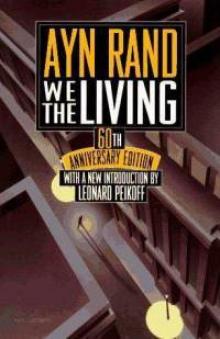 We the Living
We the Living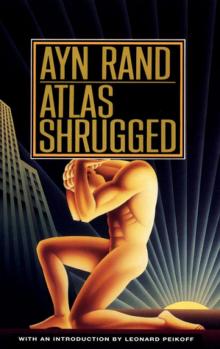 Atlas Shrugged
Atlas Shrugged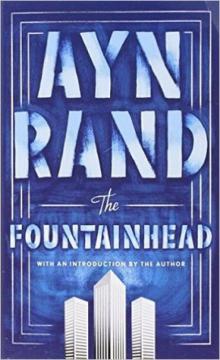 The Fountainhead
The Fountainhead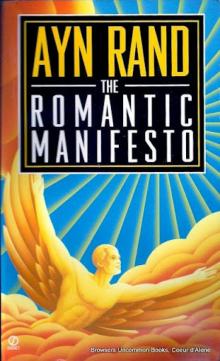 The Romantic Manifesto: A Philosophy of Literature
The Romantic Manifesto: A Philosophy of Literature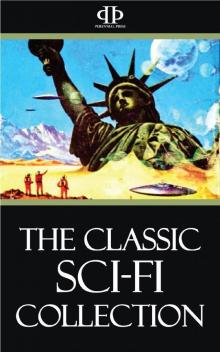 The Classic Sci-Fi Collection
The Classic Sci-Fi Collection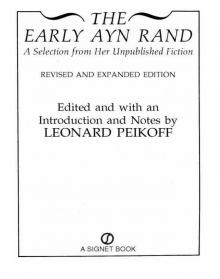 The Early Ayn Rand
The Early Ayn Rand